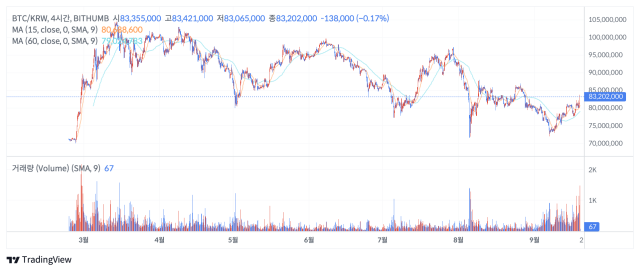
Major virtual assets are on the rise.
At 12:27 PM on the 19th, Bitcoin (BTC) recorded 83.25 million won on Bithumb, up 3.72% from the previous day. Ethereum (ETH) rose 3.84% from the previous day to 3.22 million won, Binance Coin (BNB) rose 2.74% to 749,500 won, Solana (SOL) rose 6.95% to 184,700 won, and Ripple (XRP) rose 2.35% to 785 won.
Related Articles
- [Lunch Briefing] Grayscale Launches Ripple Trust Product… “ETF Launch Aimed”
- [Lunch Briefing] Vehicle Management with Blockchain… Toyota and Ford Apply for 43 Blockchain Patents
- [Lunch Briefing] PayPal and Venmo Support Ethereum Name Service… Simplifying Virtual Asset Remittances
- [Lunch Briefing] Tether Invests $100 Million in Latin American Company 'Adeccoagro'
The international market is also on the rise. At the same time, on CoinMarketCap, BTC was recorded at $62,149.42, up 2.58% from the previous day. ETH was traded at $2,404.47, up 2.84%, BNB at $559.61, up 1.97%, SOL at $137.75, up 4.34%, and XRP at $0.5863, up 0.79%.
The total market capitalization of virtual assets increased by 2.58% from the previous day to $2.15 trillion (approximately KRW 2,865.735 trillion). The fear and greed index of virtual asset data provider Alternative.me rose 4 points from the previous day to 49 points, reaching a ‘neutral’ status.
Virtual asset custodian BitGo will launch USDS, a dollar-pegged stablecoin, in January next year.
According to foreign media on the 18th (local time), Mike Belsey, CEO of BitGo, announced a plan to launch a stablecoin in a keynote speech at the 'Token2049' event held in Singapore on that day. Like other stablecoins, USDS will be collateralized by short-term US Treasury bonds, overnight repos, and cash assets.
Belsey CEO introduced USDS as the first open-ended stablecoin. He explained that some of the profits generated from the USDS reserve will be distributed to the USDS network liquidity providers. He said, “Unlike existing stablecoins, we aim to create a more open and fair system by providing rewards to participants who build the network,” and “Since the profits are distributed to liquidity providers rather than provided to end users, it will not be classified as an investment contract.”
- Reporter Kim Jeong-woo
- woo@decenter.kr
< Copyright ⓒ Decenter, unauthorized reproduction and redistribution prohibited >








